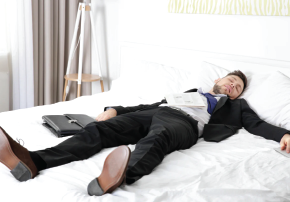The Corporate Sleeper


Sleeping Your Way Up The Corporate Ladder.
If you’re a driven, ambitious sort who sees yourself headed for loftier heights in the corporate world, you’ll need a sharp pair of elbows. You will also need to be consistently on top of your game.
Meetings, meetings, meetings. When does anyone actually work? Well, that’s what after hours are for, aren’t they? The top-down pressures of growth, competitiveness and delivery can be unrelenting. Without proper consideration for downtime and rest, it can also begin to affect your health, not to mention your productivity.
Why is sleep so important for work?
Sleep is rarely something we actively consider, right? It just happens. When we’re tired, we get some sleep. There is a lot of pressure on corporate executives to excel, even over perform, when chasing down their targets. Typically, today’s hybrid worker – commuting into the office as well as working from home – is putting in extra hours that may often be motivated by anxiety rather than objectives. There's that niggling feeling that no one's job is safe. And you're probably a bread winner. If you are sedentary all day in front of a computer, or at meetings, levels of mental pressure and stress can often lead to stiffness in the neck, shoulders and back. You might not feel you can spare those extra few hours of sleep each week.
South African sleep scientist, Dr Dale Rae, puts productivity and sleep into stark perspective. “Regular, good quality sleep is essential to everyone’s wellbeing, regardless of whether you’re a high flyer or not.” For career-driven people with a rush of thoughts going through their minds, it can be difficult to sleep if these thoughts are not properly dealt with before bed. Healthy sleep is when the body and mind go through an active process of recovery, repair and restoration. This makes high quality sleep all the more vital to give relief from the day’s challenges and equip you to be on your A-game the next day physically, mentally and emotionally.
As you fall deeper into the cycles of restorative sleep, your brain essentially sifts through the day’s thoughts and stores information for later recall. Sleep is what readies us for the day ahead. If you wake up feeling properly refreshed each morning, you will have more energy and drive, as well as a sharpness of mind, to take on whatever the next day throws at you.
“Burnout is not where anyone wants to go,” says Dr Rae. “If your day is persistently pressured and the quality of your sleep is compromised, it will eventually begin to take a toll on your physical, cognitive and psychological well-being. Actively scheduling and managing your sleep is perhaps the most important starting point in regaining focus, balance and confidence in your career and personal life."
How can I sleep and perform better?
“There can be a vicious circle between daily stress and nightly sleep deprivation,” notes Dr Rae. “The one simply exacerbates the other. And when you find yourself in that rut, it can be quite challenging to get out of it.”
Dr Rae offers a few practical pointers on how you might take back control of your sleep:
1. Understand the importance of healthy sleep
Consider sleep as one of your performance goals. Think of both your work hours and sleeping hours as prioritising quality over quantity. The sharper you are by day, the more you're likely to achieve. The number of hours you sleep, however, also needs to be considered. Most people need between 7 and 9 hours of sleep every night, although some people may be able to get away with slightly less and others may need even more. What is important is meeting your personal sleep need, which differs from person to person. But if anxiety and stress keep disrupting the quality of your sleep, you won’t be enjoying all the recuperative benefits the following day. Managing stress and anxiety during the day is, therefore, critical to achieving healthy sleep at night.
2. Pay attention to your daytime habits
Your daytime behavioural patterns, including focus, mood and diet, will be the tell-tale signs of whether you’re getting enough sleep, or more importantly the proper kind of sleep. Everyone has their off days. However, if you find that you’re experiencing prolonged fatigue and you’re not quite coping as you’d like, you’re probably not getting good quality sleep.
Sometimes it’s actually the behaviours we indulge in during the day that make it difficult for us to sleep at night. Here are some things to consider if you are struggling:
- How many cups of coffee are you consuming each day, and how close to bedtime is that last one?
- Are you stuck indoors all day with no exposure to natural sunlight?
- Do you have an exercise routine too close to bedtime?
- Are you perhaps not getting any meaningful exercise at all?
- Are you working right up until bedtime, leaving no time to decompress and wind down?
- How much screen time are you getting in the couple of hours before bedtime?
- Are you staying hydrated? Are you eating healthily or skipping meals because you’re just too busy?
If you take just a few minutes to reflect on the ‘hidden’ habits of your daily rat-race routine, you may intuitively begin to appreciate what is likely helping you to get better sleep at night, and what is not.
3. Prioritise your sleep
Find your sleep routine sweet spot. By that, we mean what feels like the most natural time to go to bed and wake up fully rested in the morning. Then stick as close as you can to your sleep routine. It is also important to make time for winding down before sleep in your routine, giving you a better chance of undisturbed, deep sleep through the night.
Where possible, try to resist the inclination to work into the night, finishing that spreadsheet, firing off emails, reviewing a major presentation or completing a report. Instead, calm your mind and ready yourself for sleep at your allotted hour. Then get back to tackling those pressing tasks first thing in the morning.
4. Consider professional sleep help
Sleep Science in Cape Town offers extensive research on how sleep is critical to our well-being. The Sleep Science vision and mission is simple: A world where people understand, respect and achieve healthy sleep and to optimise your health, well-being and performance through cutting-edge sleep research and evidence-based, best-practice sleep education and services. Sleep Science consults with people from all walks of life who have come to realise that their all-important sleep is likely the gremlin that continues to interrupt their daily well-being and performance. The corporate executive is a prime example.
Firstly, you’ll do a thorough consultation called a Sleep Check. After an initial discussion to understand your daily challenges and your current sleep patterns, your sleep will then be monitored over a 7-day period with a wrist-worn device. The data will help to address any sleep patterns that are likely interrupting proper, deep sleep. Conveniently, this Sleep Check can be done remotely, wherever you live and sleep.
Following that, you may like to set up a series of Sleep Coaching sessions. As everyone has a unique sleep pattern, this is tailored precisely to your Sleep Check data and how you manage your daily schedule. A Sleep Coach, you say? Is that even a thing? You might be interested to know how many high performing people, like top athletes, need to ‘train’ themselves for optimal sleep as well.
And thirdly, many top performers can have quite punishing international schedules. The ‘glamour’ of flitting between major cities soon loses its lustre. Sleep Science offers an individually assessed and tailored Jetlag Toolkit to help frequent travellers minimise the effects of time zone disruptions. The aim is to get your head back in the room as soon as possible with your natural body clock reattuned to your schedule.
Of course, these are just some of the scientifically researched products and services that Sleep Science offers. Take a browse through just how vital the world of sleep is at www.sleepscience.co.za.
The real cost of sleep deprivation and productivity.
There’s activity. And then there’s achievement. We can so easily confuse the two when we’re not at our sharpest. Putting in the hours does not necessarily translate into results. Corporate workers are, in fact, a bottom line cost to their employer, as well as themselves, when prolonged sleep deprivation takes hold.
Invariably, it’s taking control of our day, both professionally and privately, that helps to incorporate a healthy, productive sleep routine. Consider a life coach. (Great, so now you need to set aside yet another invaluable hour to discuss how to manage your time better.) Seriously, getting an outsider’s perspective on your challenging routine can be insightful. An experienced coach who knows all the demands of managing a high-pressure job, a relationship and family commitments, will have several tools with which to help you focus and prioritise your health and performance. When you’re able to confront challenges and reduce anxiety in private consultation, you will likely reduce the concern of family and friends as well. That’s already a big plus with which to get to sleep more peacefully each night.
Invest in your best sleep with Dial•a•Bed.
It’s a no brainer. The mattress you sleep on needs to tick all the high-performance boxes. What you expect of yourself every day is what you should expect of your mattress every night. Dial•a•Bed is South Africa’s largest branded bed store that offers every conceivable level of comfort and support to ensure you get your hard-earned rest. Explore the latest in mattress design, materials and construction at www.dialabed.co.za. Then do a personal Sleep Station test at your nearest store. Turn your bedroom into that one sanctuary where you really can disconnect and relax. And dream on about that next promotion. #SleepForLife
TAKE CARE: Lifestyle recommendation is not medical advice. Always consult your healthcare professional should you be experiencing prolonged sleep difficulties or related health issues.





